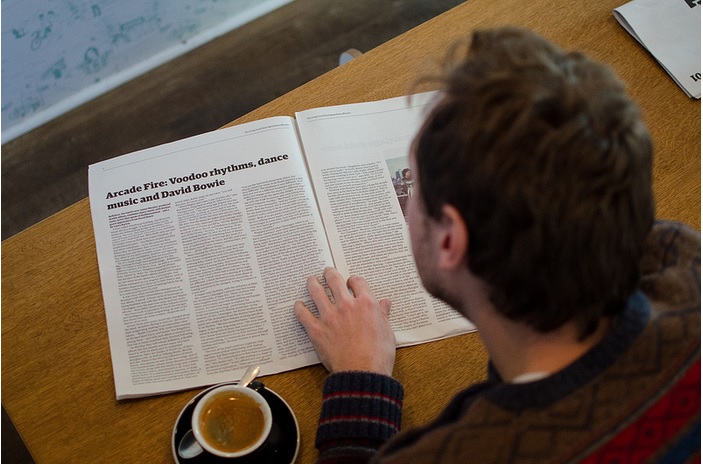The Guardian is bringing automated content-curation to U.S. newsstands using some tried and true technology: the print newspaper.
The U.K.-based newspaper will launch a monthly print edition in the U.S. on Wednesday dubbed #Open001, filled with stories selected by a proprietary algorithm.
The Guardian has already tested the waters with roboticcally compiled print editions in London. The company launched a weekly “Good Long Read” print edition last December, using its algorithm to cherry-pick long reads from the Guardian’s online content based on how well they did on social networks, favoring those that got a high number of Facebook shares, tweets, and comments.
The same algorithm was at work in making #Open001. However, according to Guardian spokesperson Gennady Kolker, the Guardian can adjust the algorithm to see what’s popular among U.S. readers.
The first stories for a U.S. audience include “Facebook’s Sheryl Sandberg: who are you calling bossy,” ”Kurt Cobain: an icon of alienation,” “Robots and sex: creepy or cool?” according to Digiday.
The London-based company has also been automating the design of these print editions, working with local London startup The Newspaper Club to print and ship these limited-run projects.
Founded in 2009 by three guys who thought the death of print was greatly exaggerated, The Newspaper Club created a free layout tool called ARTHR that generates simple, clean layouts for DIY, small-run papers. Runs can be as low as a single paper.
According to Newspaper Club engineer and cofounder Tom Taylor, the software’s most common bug is not using the correct quotation marks, and they’re working on expanding variability in designs.
“Our goal was that one person should be able to make a … paper in one hour, and we’re very close to hitting that,” Taylor said.
In London, the Good Long Read is distributed for free at another Guardian-owned experiment: a coffee shop named #GuardianCoffee. Meanwhile, the U.S. distribution solution is less quaint and more corporate-focused: Each edition will be initially limited to 5,000 copies and available free at ad agencies like Mindshare, Horizon Media, and Digitas. Kolker said the monthly runs do not contain any ads.
Indeed, The Guardian site, which already reaches 20 million unique users in the U.S. according to ComScore, has made subtle shifts to focus on the U.S. market. According to The Next Web, The Guardian’s website switched domain names last July, favoring the .com domain over .co.uk.
The paper, which recently scored a Pulitzer Prize for its reporting on the NSA, is one of the few media organizations in the industry with the luxury to experiment with print editions and coffee shops. Owned by the Scott Trust, a British company dedicated to maintaining the Guardian’s editorial independence, it is mostly free from commercial pressures.
VentureBeat's mission is to be a digital town square for technical decision-makers to gain knowledge about transformative enterprise technology and transact. Learn More

